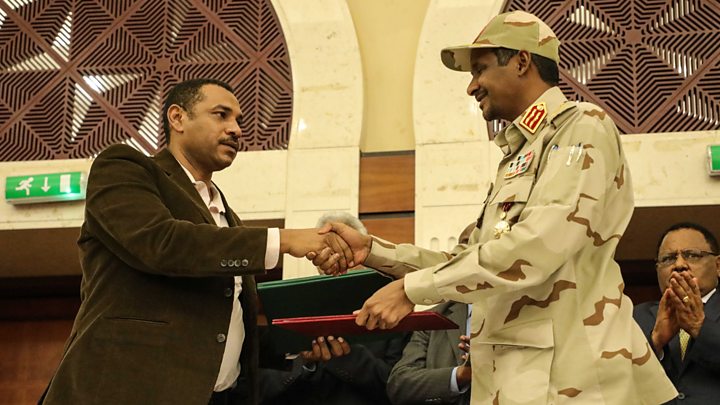Sudan to charge officers over deadly crackdown
Eight senior military officers are to be charged in Sudan with crimes against humanity over their alleged part in the killing of protesters on 3 June.
Government prosecutors announced the charges after investigating the massacre, when at least 87 people died in the capital, Khartoum.
Opposition activists say the number of deaths was closer to 130.
Protesters were killed when security forces opened fire on a sit-in to demand the military hand over power.
Under a new power-sharing accord between the opposition and the military, there is supposed to be a fully independent investigation once a new government is in place.
Under Sudan’s military law, crimes against humanity can lead to the death penalty.
What did prosecutors conclude?
Fath al-Rahman Saeed, head of the committee appointed to investigate the massacre, gave the initials of those indicted for crimes against humanity, but he did not name them.
He told a news conference that three officers had violated orders by moving security forces into the area of the sit-in protest outside the defence ministry.
The security forces had, in fact, been ordered to clear a different area of the city, nicknamed Colombia, he said.
Security forces “broke the law and entered the sit-in area”, he was quoted by AFP News agency as saying. “[They] removed the barricades, fired tear gas and fired intense and random bullets that led to the killing and wounding of protesters and the burning of tents.”
The committee head also defended the decision to clear the other area, saying: “Some outlaws exploited this gathering and formed another gathering in what is known as the Colombia area, where negative and illegal practices took place.
“It became a security threat, forcing the authorities to make necessary arrangements to clear the area.”
Giving the death toll of 87, Mr Saeed said 168 people had also been wounded.
What effect did the 3 June massacre have?
It sent shock waves through the opposition, which had been camped out for months in a mass protest campaign that achieved the removal of President Omar al-Bashir in April.
However, tens of thousands of protesters returned to the streets a few weeks later to stage the biggest demonstration since Mr Bashir’s overthrow. This forced the generals to resume talks on a power-sharing government.
The two sides eventually agreed to share power.
Source: Read Full Article




